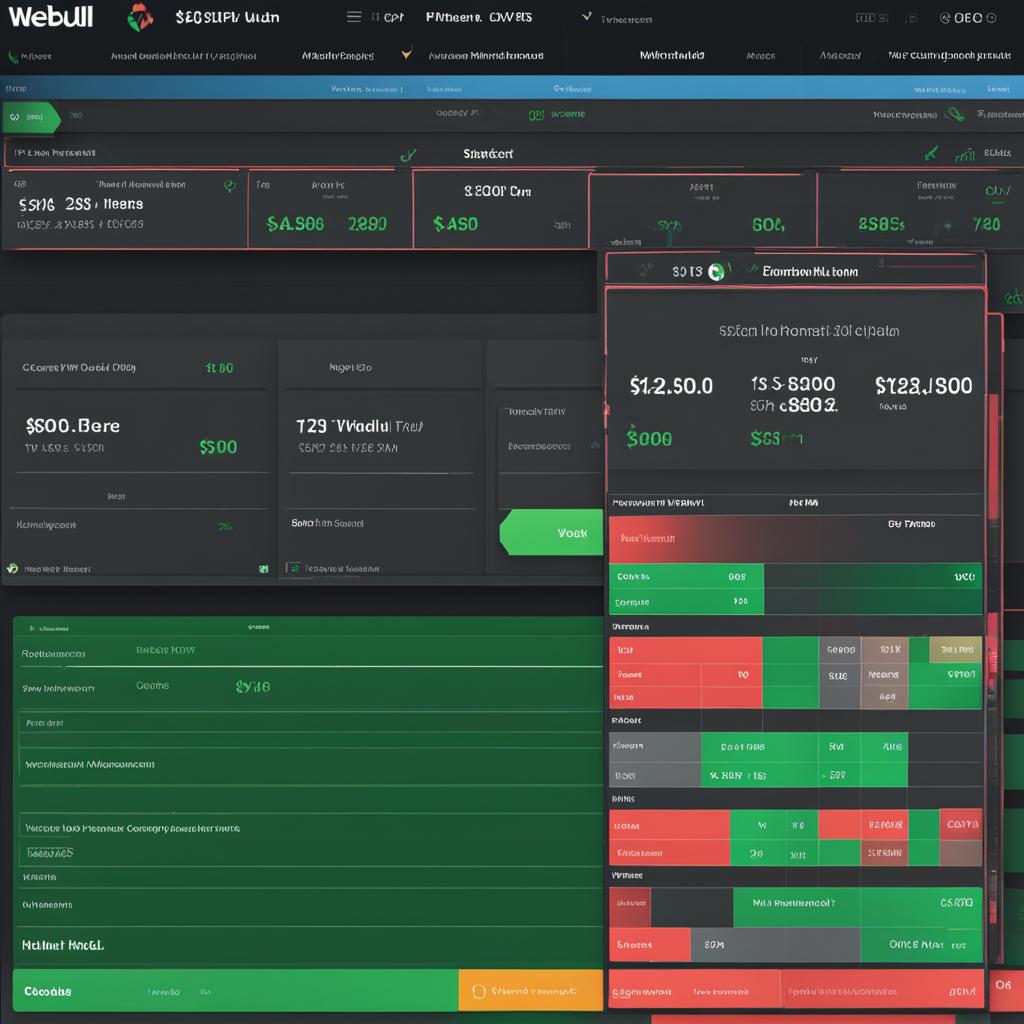Welcome to my comparison between two popular trading platforms: Webull and Robinhood. If you’re looking to invest in the stock market and want to find the best commission-free trading platform, this article is for you. Both Webull and Robinhood offer mobile trading apps that cater to beginner investors and provide a range of investment tools and research capabilities. However, there are several key differences that set them apart. Let’s dive in and explore the features and benefits of each platform.
Key Takeaways:
- Webull and Robinhood are well-known trading platforms that offer commission-free trading.
- Both platforms provide mobile trading apps, making it convenient to trade on the go.
- Webull is more suited for experienced traders, with advanced features and tools.
- Robinhood is beginner-friendly, offering a simple interface and educational resources.
- Webull allows trading in cryptocurrencies, while Robinhood does not.
Overview of Webull and Robinhood
When it comes to trading platforms, Webull and Robinhood are two popular options that offer commission-free trading. Each platform has its own unique features and characteristics, catering to different types of investors. Let’s take a closer look at what sets them apart.
Webull: Advanced Trading Platform and Robust Tools
Webull is known for its advanced trading platform that offers a wide range of tools and features. It provides a comprehensive suite of investment tools, including advanced charting, technical indicators, and real-time market data. This platform is particularly suited for experienced traders who require access to in-depth analysis and research capabilities. Webull also offers a trading simulator, allowing users to practice trading without risking real money. This feature is especially useful for beginners who want to familiarize themselves with the platform and gain confidence before diving into the stock market.
Robinhood: Simplicity and Usability
On the other hand, Robinhood focuses on simplicity and usability, making it an attractive option for beginner investors. The platform offers a clean and intuitive interface, allowing users to easily navigate and execute trades. It provides basic trading tools and educational resources to help individuals understand the stock market and make informed investment decisions. Robinhood’s user-friendly design and beginner-friendly approach make it accessible to all, regardless of their level of experience or knowledge in trading.
Both Webull and Robinhood aim to make investing more accessible and convenient for everyone. They offer commission-free trading, which means users can buy and sell stocks without incurring additional fees. Additionally, both platforms offer mobile apps, allowing users to trade on-the-go from their smartphones or tablets.
Whether you prefer the advanced features and tools of Webull or the simplicity and user-friendly interface of Robinhood, it’s important to choose a platform that aligns with your trading preferences and goals. Consider factors such as your experience level, the type of securities you want to trade, and the research capabilities you require. Ultimately, the choice between Webull and Robinhood will depend on your individual needs and preferences.
https://www.youtube.com/watch?v=S2eauXZMdzY
A Comparison of Webull and Robinhood
| Features | Webull | Robinhood |
|---|---|---|
| Advanced Trading Tools | ✅ | ❌ |
| Trading Simulator | ✅ | ❌ |
| Investment Research | ✅ | ❌ |
| Built-in Education | ❌ | ✅ |
| Commission-Free Trading | ✅ | ✅ |
| Mobile App | ✅ | ✅ |
As the table above shows, Webull offers advanced trading tools, a trading simulator, and investment research capabilities. On the other hand, Robinhood provides built-in education resources and a user-friendly interface. Both platforms offer commission-free trading and mobile apps for trading on-the-go.
It’s important to carefully evaluate the features and functionality of each platform to determine which one best aligns with your trading needs and preferences. Whether you choose the advanced capabilities of Webull or the simplicity of Robinhood, these commission-free and beginner-friendly platforms can help you kickstart your stock market investment journey.
Trading Features and Tools
When comparing Webull and Robinhood, it is important to consider the trading features and tools that each platform offers. These features play a crucial role in the overall trading experience and can greatly impact an investor’s success. Let’s take a closer look at what each platform brings to the table.
Webull
Webull prides itself on providing a more advanced trading platform that caters to experienced traders. It offers a wide range of investment tools and research capabilities, empowering users to make informed investment decisions. Here are some key features provided by Webull:
- Limit orders: Users can set specific prices at which they want to buy or sell stocks, giving them more control over their trades.
- Stop limits: This feature allows users to set a stop price and a limit price, ensuring their trades are executed only within a specified price range.
- Short selling: Webull enables users to participate in short selling, allowing them to profit from a decline in a stock’s value.
- Trading simulator: Webull provides a demo trading feature that allows users to practice trading without using real money. This gives beginners the opportunity to familiarize themselves with the platform and test different strategies.
Overall, Webull’s robust trading features and tools make it an ideal choice for experienced traders who require advanced functionalities.
Robinhood
On the other hand, Robinhood distinguishes itself as a beginner-friendly platform, focusing on simplicity and usability. While it may not offer as many advanced trading features as Webull, it provides users with the necessary tools to start their investment journey. Here are some key features provided by Robinhood:
- User-friendly interface: Robinhood’s interface is intuitive and easy to navigate, making it ideal for beginners who are new to the world of investing.
- Educational resources: Robinhood offers educational resources, including articles, videos, and podcasts, to help users learn about investing and make informed decisions.
- Basic trading tools: Although not as robust as Webull, Robinhood provides essential trading tools such as market orders and real-time stock quotes.
While Robinhood may lack the advanced features of Webull, its beginner-friendly interface and educational resources make it a suitable choice for those who are new to trading.
Now that we have explored the trading features and tools offered by both Webull and Robinhood, it’s important to assess your own trading needs and preferences. Consider your level of experience, the complexity of the features you require, and your overall investment strategy. By doing so, you can make an informed decision on which platform aligns best with your trading goals.
| Webull | Robinhood | |
|---|---|---|
| Investment Tools | Advanced tools for experienced traders | Basic tools suitable for beginners |
| Research Capabilities | Extensive research capabilities for in-depth analysis | Limited research capabilities but offers educational resources |
| Demo Trading | Provides a trading simulator for practice | No demo trading feature |
Trading Options
When it comes to trading options, both Webull and Robinhood offer a range of choices for investors. Both platforms allow users to trade stocks, options, and ETFs, giving investors ample opportunities to diversify their portfolios. However, there is a key difference between the two: Webull also offers trading in cryptocurrencies, while Robinhood does not.
Webull’s inclusion of cryptocurrencies as an investment option makes it an attractive choice for those who are interested in trading digital currencies, such as Bitcoin, Ethereum, and Litecoin. With the rising popularity of cryptocurrencies, this feature can provide investors with the opportunity to tap into this emerging market.
On the other hand, Robinhood’s focus remains on traditional investment options like stocks, options, and ETFs. While it doesn’t offer cryptocurrency trading, Robinhood still provides a wide range of investment opportunities within these asset classes.
Overall, if trading cryptocurrencies is a priority for you, Webull is the platform to consider. However, if you’re interested in trading stocks, options, and ETFs without venturing into the cryptocurrency market, both Webull and Robinhood can meet your investment needs.

| Stocks | Options | ETFs | Cryptocurrencies | |
|---|---|---|---|---|
| Webull | ✅ | ✅ | ✅ | ✅ |
| Robinhood | ✅ | ✅ | ✅ | ❌ |
Retirement Accounts
When it comes to planning for the future, having a retirement account is crucial. Webull offers its users the opportunity to invest in tax-advantaged individual retirement accounts (IRAs). With Webull, you have the flexibility to choose between a traditional IRA or a Roth IRA, depending on your specific financial goals and tax preferences. The traditional IRA allows for tax-deferred growth, while the Roth IRA offers tax-free withdrawals in retirement.
On the other hand, Robinhood currently does not offer retirement accounts. While Robinhood is a popular platform for commission-free trading and investing in stocks, options, and ETFs, it has yet to introduce retirement account options. This may be a significant factor to consider for those looking to save for retirement in a tax-advantaged account.
Investing in a retirement account is a smart way to grow your wealth for the long term. Whether you choose a traditional IRA or a Roth IRA, Webull provides the tools and support you need to plan for a financially secure retirement.

| Comparison | Webull | Robinhood |
|---|---|---|
| Availability of Retirement Accounts | Yes | No |
| Types of Retirement Accounts | Traditional IRA, Roth IRA | N/A |
With Webull’s retirement account options, you can prioritize your retirement savings while taking advantage of the tax benefits provided by IRAs. Start planning for your future today with Webull.
Cash Management Options
When it comes to managing your cash, both Webull and Robinhood offer convenient options for users. However, Robinhood goes a step further by providing additional cash management features that give users more flexibility and control over their funds.
Both platforms allow you to easily transfer money to and from your bank account using bank transfers and ACH payments. This means that you can quickly and securely deposit funds into your trading account or withdraw money when needed.
Where Robinhood sets itself apart is with its debit card feature. By linking your Robinhood account to a debit card, you can access your funds and make purchases directly from your trading account. This adds a layer of convenience, as you can seamlessly move between your investments and everyday spending.

This cash management option offered by Robinhood makes it a more convenient choice for users who want easy access to their funds without having to transfer money back and forth between accounts.
Table: Comparison of Cash Management Options
| Platform | Bank Transfers | ACH Payments | Debit Card |
|---|---|---|---|
| Webull | ✓ | ✓ | – |
| Robinhood | ✓ | ✓ | ✓ |
As shown in the table, Robinhood offers the advantage of a debit card, allowing users to seamlessly integrate their investing and spending activities. This makes it a top choice for those who want the convenience of accessing their funds directly from their trading account.
Trading Hours
When it comes to trading hours, Webull and Robinhood have some differences that may influence your decision. Webull offers extended trading hours, allowing users to make trades from 4:00 a.m. to 8:00 p.m. Eastern Time. This means you have the flexibility to engage in trading activities outside of regular market hours. On the other hand, Robinhood sticks to traditional trading hours, operating from 9:00 a.m. to 6:00 p.m. Eastern Time.
If you need to trade during extended hours, Webull provides a suitable option. Whether you prefer to make early morning trades or take advantage of late-night opportunities, Webull’s extended trading hours give you the freedom to act when it’s most convenient for you.
On the other hand, if your trading activities typically fall within regular market hours, Robinhood’s trading hours may be sufficient for your needs. It’s important to consider your individual trading habits and preferences when deciding between the two platforms.
In summary, Webull offers extended trading hours, allowing for increased flexibility, while Robinhood follows standard market hours. Take into account your trading preferences and determine which platform best aligns with your needs.
| Platform | Trading Hours |
|---|---|
| Webull | 4:00 a.m. to 8:00 p.m. Eastern Time |
| Robinhood | 9:00 a.m. to 6:00 p.m. Eastern Time |
Margin Trading
Both Webull and Robinhood offer margin trading options, allowing users to borrow money to invest. Margin trading can be a powerful tool for experienced traders looking to amplify their investment potential. However, it’s important to understand that margin trading involves additional risks and should be approached with caution.
To open a margin account with Webull, users need to maintain a minimum balance of $2,000. This requirement ensures that traders have sufficient funds to cover potential losses and meet margin calls. On the other hand, Robinhood offers margin trading through its Gold account, which also requires a minimum balance of $2,000.
Margin trading allows users to leverage their investments and potentially amplify their gains. However, it’s essential to consider the associated risks, as losses can also be magnified. Traders should have a solid understanding of the market and risk management strategies before engaging in margin trading.
Benefits and Risks of Margin Trading
Margin trading offers several benefits, including:
- Unlocking additional buying power
- Ability to pursue larger investment opportunities
- Potentially higher returns on successful trades
However, it’s important to consider the risks involved, such as:
- Increased exposure to market volatility
- Potential for significant losses
- Margin calls and potential liquidation of positions
Before engaging in margin trading, it’s crucial to thoroughly assess your risk tolerance and financial situation. It’s recommended for experienced traders who can closely monitor their positions and implement risk management strategies effectively.
Sign-Up Promotions
When it comes to sign-up promotions, both Webull and Robinhood have enticing offers to welcome new users. These promotions add value to the sign-up process and give users an extra incentive to join.
Webull rewards new individual brokerage account holders with two free stocks upon opening an account and adding at least $100 to the balance. This means you have the opportunity to receive stock investments without spending a penny. Additionally, Webull provides Amazon gift cards for new IRA account holders, based on the deposit or transfer amount made.
On the other hand, Robinhood offers a free stock to new accounts, offering a taste of stock ownership from the get-go. But that’s not all. Robinhood also incentivizes users to refer their friends by providing additional free stocks as referral bonuses. This means you could earn more stocks simply by inviting your friends to join the platform.
Sign-Up Promotions Comparison
| Webull | Robinhood | |
|---|---|---|
| Promotion | Two free stocks upon account opening and $100 balance (individual brokerage) Amazon gift cards based on deposit or transfer amount (IRA) |
One free stock upon account opening Additional free stocks for referring friends |
As you can see, both Webull and Robinhood offer attractive sign-up promotions that can enhance your investment journey. Whether it’s receiving free stocks or earning referral bonuses, these promotions give you the opportunity to kickstart your trading portfolio and potentially increase your investment value.
Now that we’ve explored the exciting sign-up promotions, let’s move on to the next section to discover whether Webull and Robinhood provide options for investing in mutual funds and bonds.
Investing in Mutual Funds and Bonds
When it comes to investment options, Webull and Robinhood primarily focus on stocks, options, ETFs, and cryptocurrencies. Unfortunately, neither platform offers the ability to invest in mutual funds or bonds. If you’re specifically interested in these types of investments, there are other brokerage firms that may better suit your needs.
Investing in mutual funds provides a way to diversify your portfolio and gain exposure to a wide range of assets. Mutual funds pool money from multiple investors to invest in stocks, bonds, and other securities. They are managed by professional fund managers who make investment decisions on behalf of the fund’s shareholders. While Webull and Robinhood do not offer mutual funds, there are many other brokerage firms that specialize in mutual funds and provide a wide selection to choose from.
Bonds, on the other hand, are fixed-income securities issued by governments, municipalities, and corporations to raise capital. They offer a predetermined interest rate and maturity date, making them a more conservative investment option than stocks. Bonds provide regular interest payments to investors and the return of principal at maturity. While Webull and Robinhood do not offer bonds, there are brokerage firms that specialize in fixed-income securities and can provide a range of bond options for investors.
When considering your investment options, it’s important to understand your goals, risk tolerance, and the specific types of investments you are interested in. By researching and exploring different brokerage firms, you can find platforms that align with your investment preferences and provide the investment options you desire.

| Investment Options | Webull | Robinhood |
|---|---|---|
| Stocks | ✔️ | ✔️ |
| Options | ✔️ | ✔️ |
| ETFs | ✔️ | ✔️ |
| Cryptocurrencies | ✔️ | ✔️ |
| Mutual funds | ❌ | ❌ |
| Bonds | ❌ | ❌ |
User Experience and Interface
When it comes to user experience and interface, both Webull and Robinhood offer intuitive and user-friendly mobile apps that have received high ratings in app stores. These platforms prioritize simplicity and ease of use, making it convenient for investors to navigate and execute trades on the go.
Webull’s platform is designed with advanced features and tools, catering to experienced traders who require in-depth market analysis and trading capabilities. The platform offers features such as limit orders, stop limits, short selling, and a trading simulator for practice trading without real money. These advanced tools enhance the user experience for experienced investors looking to make knowledgeable and precise trades.
On the other hand, Robinhood takes a more beginner-friendly approach with a simpler interface and educational resources aimed at novice investors. The platform focuses on providing an easy-to-understand trading experience, ensuring that even those new to investing can navigate the app with ease. Robinhood offers a clean and streamlined interface, making it an ideal choice for beginners who may feel overwhelmed with complex trading tools.
Whether you prefer a more advanced trading platform with comprehensive features or a beginner-friendly interface, both Webull and Robinhood have you covered. The choice ultimately depends on your level of experience and personal preference for platform complexity.
| Features | Webull | Robinhood |
|---|---|---|
| Advanced Trading Tools | ✓ | – |
| Trading Simulator | ✓ | – |
| Educational Resources | – | ✓ |
| User-Friendly Interface | – | ✓ |
Customer Support
When it comes to customer support, both Webull and Robinhood strive to provide assistance to their users. However, Webull goes a step further by offering an extensive FAQ resource page within its mobile app. This page is a valuable tool for troubleshooting and finding solutions to common issues that users may encounter. By addressing frequently asked questions, Webull ensures that users have access to helpful information right at their fingertips.
On the other hand, while Robinhood also provides customer support, it does not have a dedicated FAQ page like Webull. This can make it slightly more challenging for users to find immediate answers to their inquiries or resolve common problems. However, Robinhood still offers assistance and support to its users through other channels.
In conclusion, both Webull and Robinhood prioritize customer support, but Webull’s FAQ resource page gives it an extra advantage. By providing users with a comprehensive knowledge base, Webull ensures that they have access to resources that can help them navigate the platform more effectively.
Security and Regulation
When it comes to the security and regulation of online trading platforms, both Webull and Robinhood prioritize the safety of users’ funds. As SEC-regulated platforms and members of the Financial Industry Regulatory Authority (FINRA), they comply with strict compliance and data protection laws.
Additionally, both Webull and Robinhood provide users with the assurance of coverage from the Securities Investor Protection Corporation (SIPC). This coverage offers insurance for up to $500,000 of users’ funds in the case of broker-dealer failure.
Ensuring that your investments are protected is crucial, and both Webull and Robinhood take this responsibility seriously. By being SIPC members, they offer an extra layer of security and peace of mind while using their platforms.
In summary, both Webull and Robinhood prioritize security and adhere to strict regulatory standards. They are committed to protecting users’ funds and provide the added assurance of SIPC coverage.
| Security and Regulation Features | Webull | Robinhood |
|---|---|---|
| SEC Regulation | ✓ | ✓ |
| FINRA Membership | ✓ | ✓ |
| SIPC Coverage | ✓ | ✓ |
Conclusion
In conclusion, when it comes to choosing between Webull and Robinhood, it is essential to consider your individual preferences, investment goals, and level of trading experience. Both platforms offer commission-free trading, but they cater to different types of traders.
Webull is an excellent choice for experienced traders who require advanced features and tools. With its robust trading platform and research capabilities, Webull provides a comprehensive suite of investment tools to help traders make informed decisions. Additionally, the ability to trade cryptocurrencies sets Webull apart from Robinhood, making it a preferred choice for those interested in digital currency trading.
On the other hand, if you are a beginner investor looking for a user-friendly interface and educational resources, Robinhood is a more suitable option. Its simplicity and easy-to-use platform make it accessible to those who are new to the world of investing. While it may not offer the same level of advanced features as Webull, Robinhood focuses on providing a seamless and beginner-friendly trading experience.
Ultimately, the decision between Webull and Robinhood boils down to personal trading preferences and goals. Assess your trading needs and consider what features are most important to you. By taking the time to compare and evaluate these platforms, you can make an informed choice that aligns with your investment journey.
FAQ
What are the key differences between Webull and Robinhood?
Webull offers a more advanced trading platform with features like limit orders and short selling, while Robinhood focuses on simplicity and usability. Webull also offers trading in cryptocurrencies, whereas Robinhood does not.
What trading options are available on Webull and Robinhood?
Both Webull and Robinhood allow users to trade stocks, options, and ETFs. Webull also offers trading in cryptocurrencies.
Can I invest in a retirement account on Webull and Robinhood?
Yes, Webull offers the option to invest in a tax-advantaged individual retirement account (IRA), while Robinhood does not currently offer retirement accounts.
Do Webull and Robinhood offer cash management options?
While both platforms allow bank transfers and ACH payments, Robinhood offers additional cash management options, including a debit card linked to the account.
What are the trading hours on Webull and Robinhood?
Webull offers extended trading hours from 4:00 a.m. to 8:00 p.m. Eastern Time, while Robinhood’s trading hours are from 9:00 a.m. to 6:00 p.m. Eastern Time.
Can I engage in margin trading on Webull and Robinhood?
Yes, both Webull and Robinhood offer margin trading options, but they have different minimum balance requirements for margin accounts.
Are there any sign-up promotions for new users on Webull and Robinhood?
Yes, Webull offers free stocks for new brokerage and IRA account holders, while Robinhood offers a free stock for new accounts and additional free stocks for referring friends.
Can I invest in mutual funds and bonds on Webull and Robinhood?
No, neither Webull nor Robinhood offer the option to invest in mutual funds or bonds. They primarily focus on stocks, options, ETFs, and cryptocurrencies.
What is the user experience like on Webull and Robinhood?
Webull’s platform is more geared towards experienced traders with its advanced features, while Robinhood is designed for beginner investors with its simpler interface and educational resources.
How can I get customer support on Webull and Robinhood?
Webull provides an extensive FAQ resource page within its mobile app for troubleshooting. Robinhood also offers customer support but does not have a dedicated FAQ page.
Are Webull and Robinhood regulated and secure?
Yes, both Webull and Robinhood are SEC-regulated and members of the Financial Industry Regulatory Authority (FINRA). They also have insurance coverage for users’ funds provided by the Securities Investor Protection Corporation (SIPC).
Our Friends
- https://millennialmoney.com/webull-vs-robinhood/
- https://thesavvycouple.com/webull-vs-robinhood/
- https://filmlifestyle.com/webull-vs-robinhood/
Money posts:
 Webull vs. TD Ameritrade: Which Broker is Best for You?
Webull vs. TD Ameritrade: Which Broker is Best for You?
 Is Robinhood Gold Worth It? (What $5 per Month Gets You) (2024)
Is Robinhood Gold Worth It? (What $5 per Month Gets You) (2024)
 Interactive Brokers Review (2024)
Interactive Brokers Review (2024)
 M1 Finance vs Fidelity: Which Brokerage Is Best? (2024)
M1 Finance vs Fidelity: Which Brokerage Is Best? (2024)
 What is a Checking Account Buffer? (2024)
What is a Checking Account Buffer? (2024)
 What is a Broker-Dealer? (2024)
What is a Broker-Dealer? (2024)
 J.P. Morgan Personal Advisors Review (2024)
J.P. Morgan Personal Advisors Review (2024)
 What is Passive Income & Why It’s So Important in 2024
What is Passive Income & Why It’s So Important in 2024

